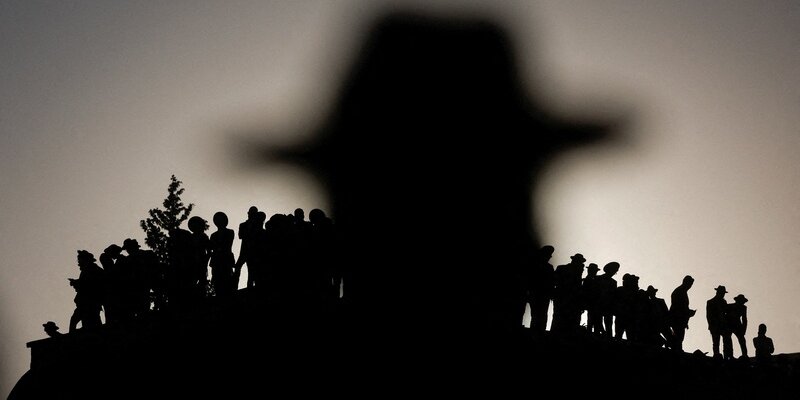Shomrim’s top investigative stories of 2021
Shomrim, established in late 2019, is a non-profit, independent news organization founded to strengthen Israeli democracy through investigative journalism. Our unique model is to conduct independent investigations to be published in partnership with existing media. To date, Shomrim has collaborated with over 20 different outlets, including Israel’s leading commercial media outlets. Alongside our documentary stories, data journalism and photojournalism, we are proud to bring you our top investigative stories of 2021
.jpg)
.jpg)
Shomrim, established in late 2019, is a non-profit, independent news organization founded to strengthen Israeli democracy through investigative journalism. Our unique model is to conduct independent investigations to be published in partnership with existing media. To date, Shomrim has collaborated with over 20 different outlets, including Israel’s leading commercial media outlets. Alongside our documentary stories, data journalism and photojournalism, we are proud to bring you our top investigative stories of 2021
.jpg)
Shomrim, established in late 2019, is a non-profit, independent news organization founded to strengthen Israeli democracy through investigative journalism. Our unique model is to conduct independent investigations to be published in partnership with existing media. To date, Shomrim has collaborated with over 20 different outlets, including Israel’s leading commercial media outlets. Alongside our documentary stories, data journalism and photojournalism, we are proud to bring you our top investigative stories of 2021
Photos: Shlomi Yosef, Daniel Dolev, Reuters, Shutterstock. Illustration: Moran Barak
Shomrim
December 29, 2021
Summary


Listen to a Dynamic Summary of the Article
Created using NotebookLM AI tool
1.
The Pandora Papers
Tax havens exposed in the largest-ever leak of financial documents
Shomrim’s flagship project for 2021 and one of the biggest journalistic stories of the year was the publication of the Pandora Papers – a collection of 12 million documents leaked from 14 companies that provide financial services in tax havens. This massive project was spearheaded by the International Consortium of Investigative Journalists, of which Shomrim is the Israeli representative, and involved more than 600 reporters in 117 countries. Two reporters from Shomrim’s investigations department – Uri Blau and Daniel Dolev – published numerous articles that were carried by every Israeli media outlet without exception. These articles included exposés of the tax havens used by Israel’s superrich, including the Ofer family, Teddy Sagi, Moshe Hogeg and Eitan Stibbe; the connection between former minister Haim Ramon and Austrian businessman Martin Schlaff; movie producer Arnon Milchan’s $500 million holdings in a tax haven; and MK Nir Barkat’s holdings in the Virgin Islands – even though he claimed for years that he was no longer involved in business activities.
2.
The Pipeline Scandal
The failings that the public never heard about – and how disaster was miraculously averted
Oil leaks from the pipelines owned by the Eilat-Ashkelon Pipeline Company have, over the past decade, caused two grave ecological disasters. This year, Shomrim’s Daniel Dolev published a series of investigations, that were also published on the Ynet internet news site, which found that these were not the only such incidents. Six months before the EAPC’s serious disaster at the Zin Stream and four years before the catastrophic leak at the Evrona National Park, there was another leak near the IDF’s Shizafon base in southern Israel, which forced the removal of 100 tons of contaminated earth from the area. But the public never heard about this incident. Similarly, we revealed this year that it took the EAPC more than seven years to remove millions of liters of fuel from a 60-year-old pipeline that it itself had described as “a ticking timebomb.” We also revealed that, three years ago, a crack was discovered in the EAPC pipeline in Haifa, just 200 meters from the Mediterranean Sea and even closer to residences. Shomrim also discovered that an internal EAPC probe found a significant dent in the pipeline.
It is not clear how this problem was resolved, but concern over a possible ecological disaster continues to grow, given plans to pump huge quantities of oil from the Emirates between Eilat and Ashkelon.
3.
The Prescription pandemic
Shomrim reveals how 1 in every 10 Israelis is in danger of addiction of opioids
Long before COVID-19, the delta variant and omicron, the United States was afflicted by a very different kind of pandemic – which, for the first time since World War II, led to a drop in Americans’ life expectancy. It also saw millions of normative people become addicted to painkillers prescribed by their family doctor and caused 500,000 deaths. That number continues to rise.
In Israel, according to a Shomrim investigation that was also published in TheMarker (Israeli business media outlet), one in 10 people take opioids. Reporter Daniel Dolev revealed in his investigation the previously unpublished minutes of the Health Ministry’s opioid committee. These minutes revealed some extremely worrying statistics, including shocking statements from physicians in the healthcare establishment – and that’s even before one takes into account what’s happening on the black market.

4.
How Israel lost the South
No governance and no security: Israel has totally neglected its southern peripheries
The Israeli public and its elected officials really don’t care about what is happening in the South. Unless something especially horrific happens, it’s not considered newsworthy. And even then, the outrage is momentary and the issue is soon forgotten. Residents of the South do not have that luxury: they live in a perpetual nightmare, in which the police have far too few officers and resources; with ever-increasing crime among the Bedouin community, hundreds of thousands of illegal firearms, violent robberies, extortion, daily burglaries and a ubiquitous sense of personal and public insecurity.
In a series of articles for Shomrim – which were also published on Ynet – Roni Singer took a deep dive into the neglect in which the Bedouin community lives and the breeding grounds for crime: from the thousands of illegal marijuana greenhouses strewn across the Negev – sometimes within a stone’s throw of massive IDF bases – which create a steady flow of untraceable cash, to the unfathomable neglect of the Bedouin community, which is forced to deal, among many other problems, with packs of feral dogs and local authorities that don’t seem to care.

5.
Privatization 2.0
The heavy social price for the privatization of welfare services
Why is a high-tech company getting involved in social work? What qualifies a company that helps people on the autism spectrum to work with young people in prostitution? Is the State of Israel trying to wipe out nonprofit organizations? A Shomrim investigation by Zeela Kotler Hadari, which was also published by Calcalist, revealed how private companies have discovered the business potential of ‘social acquisition’ and are sidelining third-sector organizations, which have specialized in social services for years and have accumulated a wealth of experience.
In a follow-up investigation, we revealed that, two years after the Welfare Ministry severed its ties with an organization offering help to gambling and alcohol addiction, fobbing responsibility off on local authorities, hundreds of addicts have not been given adequate treatment. The situation is, of course, worst in Israel’s less affluent communities in the peripheries.

6.
One scanner for 500,000 people
Israel’s healthcare system is in critical condition, with a shortfall of equipment and doctors
It’s a nerve-wracking experience that every Israeli knows all too well: they, or someone in their family, needs a complicated medical test – and that’s when the battle to get a timely appointment begins. It can take weeks or even months. The cancerous growth, meanwhile, doesn’t wait, and anyone who can fork up anywhere from 7,000 shekels to 30,000 turns to fixers and acquaintances in high places. A Shomrim investigation by Renen Netzer, which was also published by Ynet, took a standard PET-CT scan as a test case. The findings were horrifying.
And if you thought the situation was problematic today, what will happen when Israel faces a dire shortage of physicians? There’s no argument over the facts: there’s already too few doctors in Israel and the shortfall will only grow. A broad investigation by Chen Shalita took a complex issue and broke it down into its component parts: from the clinical training and the increasing tough requirements for entering the profession, to the never-ending tension between public and private medicine and the battle for every position.
%20(1).jpg)
7.
The X Files
Where does the most sensitive personal data about us end up – and who’s prying into it?
The issue of privacy – or perhaps more accurately, the lack thereof – is one of the most important challenges in the digital age and Shomrim has written extensively on the matter over the past 12 months. Chen Shalita wrote a series of articles, which were also published by Ynet, in which she asked how confidential our medical records are. Daniel Dolev’s investigation, which was also published on the Mako website, asked what happens when civil servants use their positions to access the personal files of a relative or acquaintance for their own purposes. Dolev wrote another article, published on “The Hottest Place in Hell” website, in which he looked at how police conduct illegal searches in databases containing information about every Israeli citizen – and asked who is safeguarding our privacy.

8.
Forced conservatorship
Thousands of Israelis have their basic rights denied every year by the courts
It may sound bizarre, but any Israeli citizen could wake up one morning to discover that the court has appointed a conservator and stripped them of their independence. In 97 percent of the cases, this happens without them even knowing that there’s a request or having a representative in court. Every year, tens of thousands of conservatorship requests are filed in Israel and, as Roni Singer found, there are many profound problems with the current system. As things currently stand, there’s very little to prevent someone stealing from the elderly and helpless.

9.
The backyard’s backyard
The harsh conditions facing prisoners in Israel go unreported and unnoticed – and are utterly unacceptable.
Prisoner employment is one of the best ways to encourage rehabilitation – but it can also be used to take advantage of a workforce that is paid a pittance, does not have social benefits and for which there is minimal transparency. Following a question submitted by Shomrim, the Israel Prison Service unexpectedly raised prisoner pay by a whopping 40 percent, but it doesn’t end there – as revealed in a series of articles for Shomrim by Roni Singer and Daniel Dolev. Thousands of prisoners are forced to pay for the basic goods that they need for their daily lives, and to avoid going hungry or thirsty. Moreover, when they are eventually released, some 70 percent do not go through any kind of rehabilitation process. Little wonder, then, that the recidivism rate among Israeli ex-cons is more than 40 percent.

10.
From bankruptcy to CEO
How one charity provided a “Warm Home” for Holocaust survivors – as well as for relations and associates of its CEO
A recent fundraising telethon on Channel 13 portrayed Shimon Sabag as a philanthropist who has “dedicated his whole life to Holocaust survivors,” thanks to the Yad Ezer L'Haver foundation that he established. The Israeli public was moved by the appeal and donated millions of shekels, which were augmented by large donations from American evangelists. An investigation for Shomrim by Uri Blau and Shay Fogelman, which was also published by TheMarker, exposed how Sabag’s path to primetime television included bankruptcy, close connections with the Netanyahu family, selling apartments owned by the foundation to relatives and associates – and a horrific death by suicide of one of the foundation’s tenants in a fire.
.jpg)













